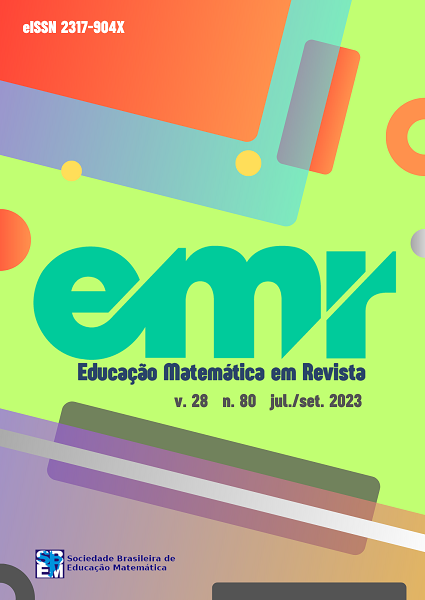How to think about games and learning for students with Autism Spectrum Disorder?
DOI:
https://doi.org/10.37001/emr.v28i80.3323Keywords:
Inclusive Education, Children with Autistic Spectrum Disorder, Egames, Math EducationAbstract
This article is a theoretical-empirical research on Inclusive Education for students with Autism Spectrum Disorder (ASD), in learning Mathematics through educational games. To this end, we present the results of the Systematic Literature Review and Field Research of our already completed Master's Dissertation, which addressed the aforementioned object, applied in the Multifunctional Resource Rooms (SRM) during the Specialized Educational Service (AEE), in the city Caruaru-PE. Our objective was to investigate the impact of the lack of continuing training for teachers, as well as the need to create and maintain new public policies aimed at promoting Inclusive Education. The structural method, with descriptive and qualitative approaches, was adopted to discuss: what are the advances and challenges in learning Mathematics for students with ASD, through educational games? As theoretical support, we use the contributions of Freire, Vygotsky, Cunha, Saviani. As a result, it was found that the fragility of teacher training, within the scope of continuing education, contributes to the deficiency in the application of new practices for learning Mathematics through educational games, which therefore denounces the need for implementation and maintenance of public policies that meet these needs, with regard to Inclusive Education. Furthermore, it was possible to demarcate the urgency of expanding academic research aimed at including students with ASD, since data collection of this type highlighted a large gap in studies on this specificity of Inclusive Education.
Downloads
References
APA - American Psychiatry Association Diagnostic and Statistical Manual of Mental disorders - DSM - 5. 5th.ed. Washington: American Psychiatric Association, 2013.
BARBOSA, R. S.; BUZETTI, M. C.; COSTA, M. P. R. Educação Especial, Adaptações Curriculares e Inclusão Escolar: Desafios na Alfabetização. São Carlos: Pedro & João Editores, 2019.
BRASIL. Decreto 7611/2011. Institui o atendimento educacional especializado. 2011.
______. Lei nº 9.394 de 20 de dezembro de 1996. Estabelece as diretrizes e bases da educação nacional. Casa Civil; Subchefia para Assuntos JurÃdicos, BrasÃlia, DF, 20 dez. 1996. DisponÃvel em: http://www.planalto.gov.br/ccivil_03/Leis/L9394.htm. Acesso em: 08 de janeiro de 2023.
______. Ministério da Educação. Conselho Nacional de Educação, Resolução Nº 4, de 2 de out. de 2009, BrasÃlia.
______. Ministério da Educação. Secretaria de Educação Especial. Salas de Recursos Multifuncionais: espaço para atendimento educacional especializado. BrasÃlia, DF: 2006.
______. PolÃtica Nacional de Proteção dos Direitos da Pessoa com Transtorno do Espectro Autista. Lei n. 12.764, de 27 de dezembro de 2012. DisponÃvel em: http://www.planalto.gov.br/ccivil_03/_ato 2011-2014/2012/lei/l12764.htm. Acesso em: 08 de janeiro de 2023.
______. Secretaria de Educação Fundamental. Parâmetros Curriculares Nacionais: Matemática. 3. vol. BrasÃlia: MEC/SEF, 1997. DisponÃvel em: http://portal.mec.gov.br/seb/arquivos/pdf/livro03.pdf. Acesso em: 08 de janeiro de 2023.
BUSATO, S. C. C. Estratégias Facilitadoras para o Ensino de Matemática no Ensino Fundamental para Crianças do Espectro Autista. Revista CientÃfica Intelletto. v.2, n.2. Venda Nova do Imigrante, ES. p. 163-171, 2016.
CUNHA, E. Autismo e inclusão: psicopedagogia práticas educativas na escola e na famÃlia. 4 edição. Rio de Janeiro: Editora Wak, 2012.
Direito das pessoas com deficiência. Equidade. Politize – 12/10/2021. DisponÃvel em: https://www.politize.com.br/. Acesso em: 08 de janeiro de 2023.
FREIRE, Paulo; FAUNDEZ, Antonio. Por uma pedagogia da pergunta. 5. ed. Rio de Janeiro: Paz e Terra, 2002. 158 p.
FREIRE, Paulo. Pedagogia da autonomia. Saberes necessários à prática educativa. 25ª ed. São Paulo: Paz e Terra, 1996. – (Coleção Leitura)
MARQUES, Isabela. Qual a prevalência do autismo no Brasil? Genial Care – 04 de outubro de 2022. DisponÃvel em: https://genialcare.com.br › blog. Acesso em: 08 de janeiro de 2023.
KUENZER, Acacia Z. A pedagogia da fábrica: as relações de produção e a educação do trabalhador. São Paulo, Cortez, 1985.
ORRÚ, S. E. Aprendizes com autismo: aprendizagem por eixos de interesse em espaços não excludentes. Petrópolis, RJ: Vozes, 2016.
SAVIANI, Dermeval. História das idéias pedagógicas no Brasil. Campinas: Autores Associados, 2007.
VYGOTSKY, L. S. A formação social da mente: o desenvolvimento dos processos psicológicos superiores. 6 ed. São Paulo: Martins Fontes, 1989.
Published
How to Cite
Issue
Section

This work is licensed under a Creative Commons Attribution-NonCommercial-ShareAlike 4.0 International License.






